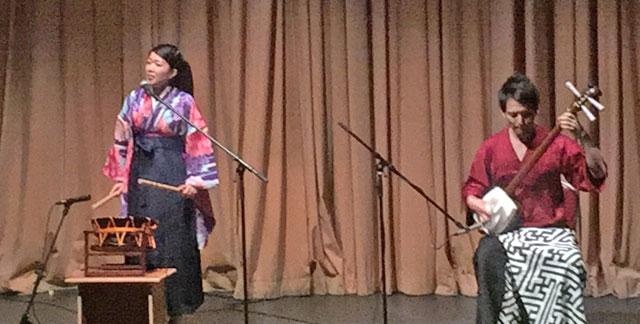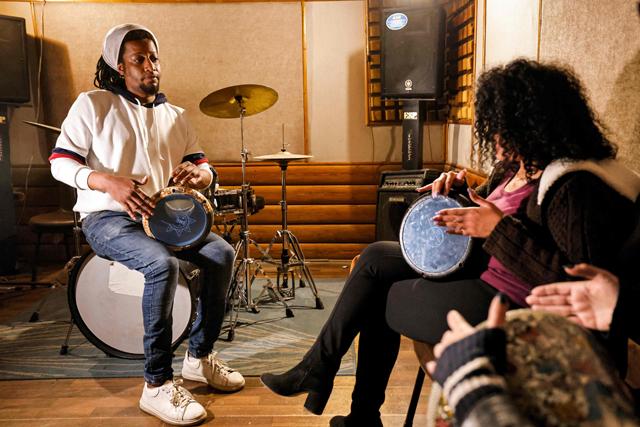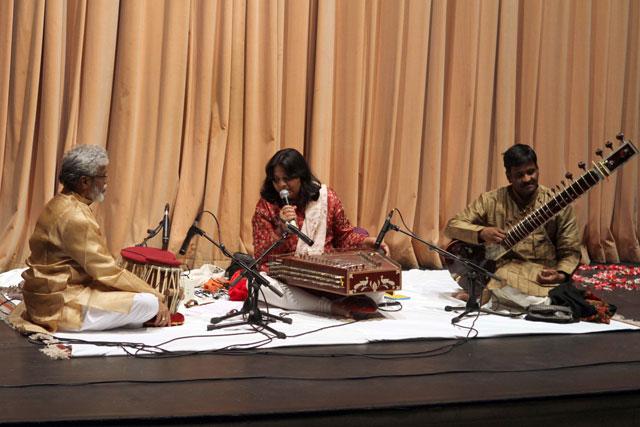You are here
Japanese folk music concert brings shamisen tunes to Jordan
By Suzanna Goussous - Nov 23,2016 - Last updated at Nov 23,2016

Japanese musicians perform during a concert at Al Hussein Cultural Centre in Ras Al Ain on Tuesday (Photo by Suzanna Goussous)
AMMAN — Seeking to spread Japan's traditional and folk music around the world, and promote intercultural dialogue through singing and playing different genres of music, Japanese singer Akari Mochizuki and shamisen player Habiki Ichikawa on Tuesday performed a musical show for a Jordanian.
The traditional Japanese three-string instrument, which holds stories from history for about 500 years, was first used in its original version in China. It was then moved to Okinawa, the southern island of Japan, where a smaller version of the instrument was developed.
The smaller version produced was then brought to central Japan and went on to become a nationwide instrument, according to Mochizuki.
The shamisen is made of wound silk threads on a body covered with stretched cloth from Japan, which receives interest from all over the world, according to the musicians.
“I started singing when I was three, due to my father’s influence. My father was in love with Japanese traditional music, so he was teaching me how to sing since I was very little," Mochizuki said.
“Since then, I [have been] singing every day, attending contests and winning awards, and started gaining confidence as a singer.”
The vocal artist, who moved to England around 14 years ago, learned how to sing in English, but she later realised it is “a very competitive world”, so she decided to “stick with her origin” and focus on performing Japanese folk songs.
“The importance of music is all about reaching the people’s minds, without words or lyrics; music can reach anybody’s heart; I think that’s the most important part as a musician,” she said.
In 2009, Mochizuki started working as a professional singer in London at an upscale Japanese restaurant where various important figures of the Japanese community used to dine, which introduced her to various opportunities.
The non-Japanese audience always provides “positive feedback” when attending Japanese concerts, she said.
“I feel it’s really important to give them the opportunity to find the difference in music and sometimes similarities,” the artist explained.
“Music can be universally accepted by any culture and people, especially Japanese folk songs, that hold on to the themes of... nature, hometown, and [family], which are all in your heart and people can relate to,” she told The Jordan Times.
Ichikawa, who has been playing the shamisen for about 15 years, said the instrument's unique sound attracted him to play it professionally.
Noting that his skills as a guitarist helped him master the traditional shamisen, the musician said one needs to be relaxed and focused to produce accurate rhythms.
“It is easy to express my feelings with this instrument,” he said.
“I try to always adapt and mix the cultures so that I don’t always have to stick with the very traditional side. I try to see something in between the modern and the traditional, the Western and Eastern,” the shamisen player said.
“For me, it is more important that people feel closer and more familiar to the music.”
Related Articles
CAIRO — Many Egyptians associate the tabla drum with belly dancers and seedy nightclubs but, despite its image problem, percussionists are g
A concert featuring classical Indian music was held at the King Hussein Cultural Centre on Tuesday evening for Jordanians to enjoy and get acquainted with India’s cultural heritage.
AMMAN — Dozan Wa Awtar Singers, Jordan’s most famous choir, is once again in the limelight, this time with a significant difference. “














